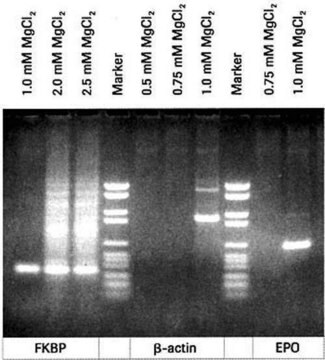M4880
Magnesiumchlorid
BioReagent, suitable for insect cell culture, ≥97.0%
Synonym(e):
Magnogene
About This Item
Empfohlene Produkte
Produktlinie
BioReagent
Qualitätsniveau
Assay
≥97.0%
Form
powder
Methode(n)
cell culture | insect: suitable
mp (Schmelzpunkt)
714 °C (lit.)
Löslichkeit
water: 468.7 g/L at 20 °C
Dichte
2.32 g/mL at 25 °C (lit.)
SMILES String
Cl[Mg]Cl
InChI
1S/2ClH.Mg/h2*1H;/q;;+2/p-2
InChIKey
TWRXJAOTZQYOKJ-UHFFFAOYSA-L
Suchen Sie nach ähnlichen Produkten? Aufrufen Leitfaden zum Produktvergleich
Anwendung
- as a metal cofactor supplement in the terminal deoxynucleotidyl transferase (TdT) reaction
- as a component of Tris assay buffer to prepare substrate stocks for /-N-Acyl lysine substrate screening
- as a component of low-calcium differentiation medium for keratinocyte differentiation
Lagerklassenschlüssel
13 - Non Combustible Solids
WGK
WGK 1
Flammpunkt (°F)
Not applicable
Flammpunkt (°C)
Not applicable
Persönliche Schutzausrüstung
Eyeshields, Gloves, type N95 (US)
Analysenzertifikate (COA)
Suchen Sie nach Analysenzertifikate (COA), indem Sie die Lot-/Chargennummer des Produkts eingeben. Lot- und Chargennummern sind auf dem Produktetikett hinter den Wörtern ‘Lot’ oder ‘Batch’ (Lot oder Charge) zu finden.
Besitzen Sie dieses Produkt bereits?
In der Dokumentenbibliothek finden Sie die Dokumentation zu den Produkten, die Sie kürzlich erworben haben.
Kunden haben sich ebenfalls angesehen
Protokolle
Summary application report for analysis of moisture in Magnesium chloride
Unser Team von Wissenschaftlern verfügt über Erfahrung in allen Forschungsbereichen einschließlich Life Science, Materialwissenschaften, chemischer Synthese, Chromatographie, Analytik und vielen mehr..
Setzen Sie sich mit dem technischen Dienst in Verbindung.





